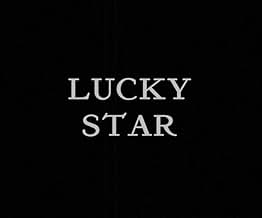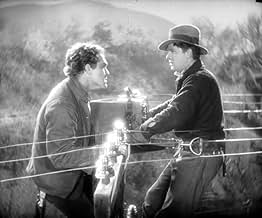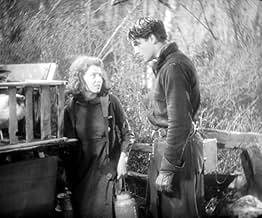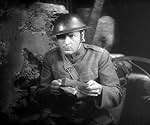AVALIAÇÃO DA IMDb
7,6/10
1,6 mil
SUA AVALIAÇÃO
Adicionar um enredo no seu idiomaMary, a poor farm girl, meets Tim just as word comes that war has been declared.Mary, a poor farm girl, meets Tim just as word comes that war has been declared.Mary, a poor farm girl, meets Tim just as word comes that war has been declared.
- Direção
- Roteiristas
- Artistas
- Prêmios
- 1 vitória no total
Avaliações em destaque
If someone wants to understand what happened between the end of the silent period and the beginning of sound, to experience an immersion in the sort of lyrical romance that people responded to at the time, there are few better films than Lucky Star. Both of the featured players, Janet Gaynor and Charles Farrell had already established themselves as audience favorites in films from Seventh Heaven on, and this simple tale of a crippled soldier finding love with a rustic local girl allowed both of them to give rich, likable performances without gross exaggeration or hysteria. For contemporary moviegoers, accustomed to multiple layers of irony and a cynical take on romance between a man and a woman, this film may be laughable, but for those willing to transport themselves to another world (which is what film can do so well!) director Frank Borzage's magical, shadowy, soft-focus rustic never-never land creates a sweet, idyllic romance
Lucky Star is a lovely film. It's good to have a contrast, I ended up watching ten minutes of the Fantastic Four before this film. So after that incredible dross, the Borzage was a double-barrelled blast of wonder to the face. It's a very simple movie story-wise. We start off looking at a farm very early in the morning, still dark, it's awesomely Gothic, probably a set because it's so perfect, but you can't tell. You got these windy lanes and crooked fenceposts and creepy trees. Mary (Janet Gaynor) a dirty and chiselling but winsome little ragamuffin lives on the farm with her Ma and some littl'uns, Pa ain't around. She's milking the cow, probably at five in the morning, when the house is getting up. You can tell that life is pretty hard. It's about 2 minutes of cinema that's more precious than a dozen movies.
Anyway there's these two men Wrenn and Tim. Wrenn is a lazy good-fer-nuthin who is the foreman of the telegraph gang. Tim is the one he always gets to do the hard work. World War One comes and these guys decide to get a load of the world and pack off to France. Anyway we're shown in no uncertain terms during this episode how Tim is a nice guy and Wrenn, well he ain't. Private Tim ends up in a wheelchair when he gets back, on account of Sergeant Wrenn.
Mary is a grown up now, and Tim and Wrenn are vying for her affections. Wrenn has got the head start because he's a blackguard and he's not crippled. So it's a love story. It all seems real simple, but the nuance is what it's all about, the exquisite lighting and camera-work, the great partnership between Gaynor (Mary) and Farrell (Tim), and the heart-rending final scenes. It's simply a charming innocent movie, that there's no way could be made any more.
Tim has to undergo a harrowing struggle in order to get the girl. The snow scenes towards the end have to be seen to be believed.
Anyway there's these two men Wrenn and Tim. Wrenn is a lazy good-fer-nuthin who is the foreman of the telegraph gang. Tim is the one he always gets to do the hard work. World War One comes and these guys decide to get a load of the world and pack off to France. Anyway we're shown in no uncertain terms during this episode how Tim is a nice guy and Wrenn, well he ain't. Private Tim ends up in a wheelchair when he gets back, on account of Sergeant Wrenn.
Mary is a grown up now, and Tim and Wrenn are vying for her affections. Wrenn has got the head start because he's a blackguard and he's not crippled. So it's a love story. It all seems real simple, but the nuance is what it's all about, the exquisite lighting and camera-work, the great partnership between Gaynor (Mary) and Farrell (Tim), and the heart-rending final scenes. It's simply a charming innocent movie, that there's no way could be made any more.
Tim has to undergo a harrowing struggle in order to get the girl. The snow scenes towards the end have to be seen to be believed.
Lucky Star (1929)
*** (out of 4)
Entertaining silent drama has Timothy (Charles Farrell) and poor farm girl Mary (Janet Gaynor) meeting under bad circumstances before the start of WWI. After the war Timothy returns home as a cripple and soon he and Mary strike up a strong friendship, which doesn't sit too well with people in town or Mary's mother due to their prejudice against him being cripple. LUCKY STAR should have been a complete disaster but director Frank Borzage and the two stars do a remarkable job at building up the drama and there's no question that the message really packs a punch. The film is incredibly dark and this is especially true when it comes to the message of how people were pretty much throwing cripples into a lonely shack and forgetting about them. The message of this not being right is certainly well told here and especially because there's no melodrama preaching but instead it's perfectly built into the story. I was really surprised to see how dark this part of the story was told and it's pretty darn grim. Some of the best moments in the film deal with the blossoming relationship between the two stars. They made several films together and it's easy to see why because their chemistry just jumps right off the screen. The romance here is quite good and manages to keep a smile on your face throughout. Gaynor, as you'd expect, has no trouble playing the charming farm girl and Farrell is just as great and especially during his more dramatic scenes dealing with not being able to walk. Guinn 'Big Boy' Williams is excellent as the rival for Gaynor's attention and Hedwiga Reicher makes for a great villain as her mother. The ending is incredibly far-fetched but it's so perfectly executed that you can't help but get caught up in the drama.
*** (out of 4)
Entertaining silent drama has Timothy (Charles Farrell) and poor farm girl Mary (Janet Gaynor) meeting under bad circumstances before the start of WWI. After the war Timothy returns home as a cripple and soon he and Mary strike up a strong friendship, which doesn't sit too well with people in town or Mary's mother due to their prejudice against him being cripple. LUCKY STAR should have been a complete disaster but director Frank Borzage and the two stars do a remarkable job at building up the drama and there's no question that the message really packs a punch. The film is incredibly dark and this is especially true when it comes to the message of how people were pretty much throwing cripples into a lonely shack and forgetting about them. The message of this not being right is certainly well told here and especially because there's no melodrama preaching but instead it's perfectly built into the story. I was really surprised to see how dark this part of the story was told and it's pretty darn grim. Some of the best moments in the film deal with the blossoming relationship between the two stars. They made several films together and it's easy to see why because their chemistry just jumps right off the screen. The romance here is quite good and manages to keep a smile on your face throughout. Gaynor, as you'd expect, has no trouble playing the charming farm girl and Farrell is just as great and especially during his more dramatic scenes dealing with not being able to walk. Guinn 'Big Boy' Williams is excellent as the rival for Gaynor's attention and Hedwiga Reicher makes for a great villain as her mother. The ending is incredibly far-fetched but it's so perfectly executed that you can't help but get caught up in the drama.
LUCKY STAR (Fox, 1929), directed by Frank Borzage, follows the familiar pattern of sentimental love stories most associated with director and his young romantic team of Janet Gaynor and Charles Farrell. For their third screen venture together, following the success of SEVENTH HEAVEN (1927) and STREET ANGEL (1928), Borzage works wonders with them again in the story based on Tristram Tupper's "Three Episodes in the Life of Timothy Osborn" by which Farrell's character dominates the screen, but whenever together with Gaynor, they're quite equivalent. LUCKY STAR seems to be an odd title for the selected story in question since it's not one that takes place in Hollywood as did Gaynor's much latter success of A STAR IS BORN (1937). Regardless of what it's titled, as Gaynor's character would frequently say, "that's gran."
The scenario takes place in a rural setting on a farm where the widowed "Ma" Tucker (Hedwig Reicher)raises her four yungins, the eldest being Mary (Janet Gaynor). After driving her horse and buggy to town selling drinking items to electrical linemen for a nickel, she attracts the attention of Timothy Osborn (Charles Farrell) working on top of the telephone pole. Trying to cheat Martin Wrenn (Guinn Williams), the foreman, by acquiring an extra nickel from him with the indication she wasn't paid, Timothy comes to the girl's defense which starts a fight between him and Wrenn on top of the pole. The fight is interrupted with the news that war has been declared. Before Timothy enlists with Wrenn, he gives Mary a spanking for hiding the nickel thrown to her by his foreman. After two years in France at the war front, Wrenn returns home from the Army still retaining his sergeant's uniform while Timothy, having met with serious accident, is wheelchair bound, living alone in his cottage fixing broken things to keep busy. Still remembering the spanking, Mary (now 18) throws a stone through Timothy's window, but after meeting again, they soon become the best of friends, with Timothy affectionately giving Mary the pet name of "Baa Baa." When forbidden by her mother to have anything to do with the crippled Timothy, Mary passes Wrenn off as the escort who walked her home from the barn dance. Taking an immediate liking to Wrenn, Mrs. Tucker sees a great opportunity for a better lifestyle for all by arranging for Mary to marry Wrenn, regardless of her true love for Timothy.
With all the elements of an early D.W. Griffith rural melodrama, LUCKY STAR rightfully belongs to Borzage, through fine visuals and the re-inventing of certain aspects that played so well with SEVENTH HEAVEN. The World War is worked into the plot once again, but to a limited degree. However, poor Gaynor plays an abused urchin, substituting the whipping from her older sister to facial slaps from her oppressed mother. The one who gathers more sympathy turns out to be Timothy (Farrell), especially during the film's second portion as a handicapped war veteran rather. As much as Gaynor gathers much attention with her sympathetic charm and fragile round face, this time Borzage gives Farrell the opportunity with crucial scenes where, after hugging Mary, his facial expression, telling more than actual words, who, at that very moment, comes to realize how much he loves her; along with Timothy's struggling attempt to walk again by holding on to his crutches and falling off from them. Another scene worth mentioning, played more for laughs than tears, has Timothy washings Mary's hair with a dozen eggs, resulting to Mary's hair resembling that of Little Orphan Annie's. Scenes involving Farrell and Williams starts off in humorous fashion between two men as friends one moment and fist fighting the next. Their sort of friendship comes to a halt as Wrenn interferes with Timothy's romance. Other members of the cast include Paul Fix (Joe); Gloria Grey (Flora Smith); and Hector V. Sarno ("Pop" Fry).
Released at a time when talkies were dominant over silents, a few lines of spoken dialog were inserted into the story between the two lucky stars during its initial theatrical run. LUCKY STAR, which had been out of circulation since its initial release, was thought to be among the many missing from the silent era. However, the film was finally discovered, with talking sequences no longer available, restored by the Netherlands Film Museum, and unveiled in 1991, notably at the Telluride Film Festival and the Museum of Fine Arts with piano accompaniment by Bob Winter, and other revival movie houses before cable television broadcast on Turner Classic Movies (TCM premiere: October 9, 2012).
Never distributed on home video, a long awaited release onto DVD became a reality in 2008 as part of the Frank Borzage collection for 20th Century Fox Home Entertainment. The print not only contains newly inserted inter-titles, but a new but somewhat unsatisfactory musical score composed and conduced by Christopher Caliendo, making one long for recovery of the lost Movietone soundtrack that accompanied the film back in 1929. The rediscovery of LUCKY STAR, overall, gives film scholars and historians a rare opportunity viewing Gaynor and Farrell at their prime, thanks to the fine direction of Frank Borzage. (***)
The scenario takes place in a rural setting on a farm where the widowed "Ma" Tucker (Hedwig Reicher)raises her four yungins, the eldest being Mary (Janet Gaynor). After driving her horse and buggy to town selling drinking items to electrical linemen for a nickel, she attracts the attention of Timothy Osborn (Charles Farrell) working on top of the telephone pole. Trying to cheat Martin Wrenn (Guinn Williams), the foreman, by acquiring an extra nickel from him with the indication she wasn't paid, Timothy comes to the girl's defense which starts a fight between him and Wrenn on top of the pole. The fight is interrupted with the news that war has been declared. Before Timothy enlists with Wrenn, he gives Mary a spanking for hiding the nickel thrown to her by his foreman. After two years in France at the war front, Wrenn returns home from the Army still retaining his sergeant's uniform while Timothy, having met with serious accident, is wheelchair bound, living alone in his cottage fixing broken things to keep busy. Still remembering the spanking, Mary (now 18) throws a stone through Timothy's window, but after meeting again, they soon become the best of friends, with Timothy affectionately giving Mary the pet name of "Baa Baa." When forbidden by her mother to have anything to do with the crippled Timothy, Mary passes Wrenn off as the escort who walked her home from the barn dance. Taking an immediate liking to Wrenn, Mrs. Tucker sees a great opportunity for a better lifestyle for all by arranging for Mary to marry Wrenn, regardless of her true love for Timothy.
With all the elements of an early D.W. Griffith rural melodrama, LUCKY STAR rightfully belongs to Borzage, through fine visuals and the re-inventing of certain aspects that played so well with SEVENTH HEAVEN. The World War is worked into the plot once again, but to a limited degree. However, poor Gaynor plays an abused urchin, substituting the whipping from her older sister to facial slaps from her oppressed mother. The one who gathers more sympathy turns out to be Timothy (Farrell), especially during the film's second portion as a handicapped war veteran rather. As much as Gaynor gathers much attention with her sympathetic charm and fragile round face, this time Borzage gives Farrell the opportunity with crucial scenes where, after hugging Mary, his facial expression, telling more than actual words, who, at that very moment, comes to realize how much he loves her; along with Timothy's struggling attempt to walk again by holding on to his crutches and falling off from them. Another scene worth mentioning, played more for laughs than tears, has Timothy washings Mary's hair with a dozen eggs, resulting to Mary's hair resembling that of Little Orphan Annie's. Scenes involving Farrell and Williams starts off in humorous fashion between two men as friends one moment and fist fighting the next. Their sort of friendship comes to a halt as Wrenn interferes with Timothy's romance. Other members of the cast include Paul Fix (Joe); Gloria Grey (Flora Smith); and Hector V. Sarno ("Pop" Fry).
Released at a time when talkies were dominant over silents, a few lines of spoken dialog were inserted into the story between the two lucky stars during its initial theatrical run. LUCKY STAR, which had been out of circulation since its initial release, was thought to be among the many missing from the silent era. However, the film was finally discovered, with talking sequences no longer available, restored by the Netherlands Film Museum, and unveiled in 1991, notably at the Telluride Film Festival and the Museum of Fine Arts with piano accompaniment by Bob Winter, and other revival movie houses before cable television broadcast on Turner Classic Movies (TCM premiere: October 9, 2012).
Never distributed on home video, a long awaited release onto DVD became a reality in 2008 as part of the Frank Borzage collection for 20th Century Fox Home Entertainment. The print not only contains newly inserted inter-titles, but a new but somewhat unsatisfactory musical score composed and conduced by Christopher Caliendo, making one long for recovery of the lost Movietone soundtrack that accompanied the film back in 1929. The rediscovery of LUCKY STAR, overall, gives film scholars and historians a rare opportunity viewing Gaynor and Farrell at their prime, thanks to the fine direction of Frank Borzage. (***)
"Lucky Star" boasts an exceptional performance by Charles Farrell as the handicapped Tim, who falls in love with a pathetic waif, "Baa-Baa", played by the sweet and petite Janet Gaynor. Whereas in "7th Heaven", Janet Gaynor gives the performance of a lifetime, here in this film it is Charlie Farrell who wows you with his believable, dynamic acting as Tim, a good man maimed in World War One, who comes home in a wheelchair and has to cope with being lame. One can easily see Charles was much more than your typical Hollywood "pretty boy", so it is kind of bizarre that the studios quickly forgot his excellent silent film performances, and put him in vehicles like musicals once sound came in, thereby destroying what should have been a continued dramatic career throughout the coming decades.
Frank Borzage was a sentimental director whose work I have always enjoyed. He continued to make some excellent sound films as the years went on, but his silent films are his most memorable, for he had a knack of drawing excellent and subtle pantomime performances from his actors which communicated emotions far more profoundly without words than with them. I would like to see this film restored and placed on DVD so that future generations can see it. Keeping it locked up - and forcing people to watch poor bootlegs - does not do honor to this film, or to Borzage, Farrell, and Gaynor. They deserve the best showcase for this moving film. I do feel the ending - which I won't reveal - is a cop-out, but other than that "Lucky Star" is a film well worth seeing.
Frank Borzage was a sentimental director whose work I have always enjoyed. He continued to make some excellent sound films as the years went on, but his silent films are his most memorable, for he had a knack of drawing excellent and subtle pantomime performances from his actors which communicated emotions far more profoundly without words than with them. I would like to see this film restored and placed on DVD so that future generations can see it. Keeping it locked up - and forcing people to watch poor bootlegs - does not do honor to this film, or to Borzage, Farrell, and Gaynor. They deserve the best showcase for this moving film. I do feel the ending - which I won't reveal - is a cop-out, but other than that "Lucky Star" is a film well worth seeing.
Você sabia?
- CuriosidadesAccording the Netherlands Film Museum, which restored "Lucky Star", the film was originally a part talkie, with some dialog and effects, but the soundtrack has been lost.
- Citações
Mary Tucker: What's the matter with your feet?
Timothy Osborn: Nothing - just saving my legs.
Mary Tucker: What you savin' 'em for?
Timothy Osborn: For a special occasion.
- ConexõesFeatured in Murnau, Borzage and Fox (2008)
Principais escolhas
Faça login para avaliar e ver a lista de recomendações personalizadas
Detalhes
- Tempo de duração
- 1 h 40 min(100 min)
- Cor
- Mixagem de som
Contribua para esta página
Sugerir uma alteração ou adicionar conteúdo ausente
















